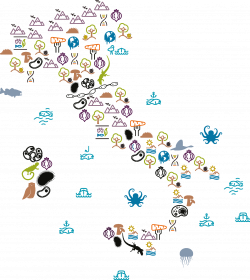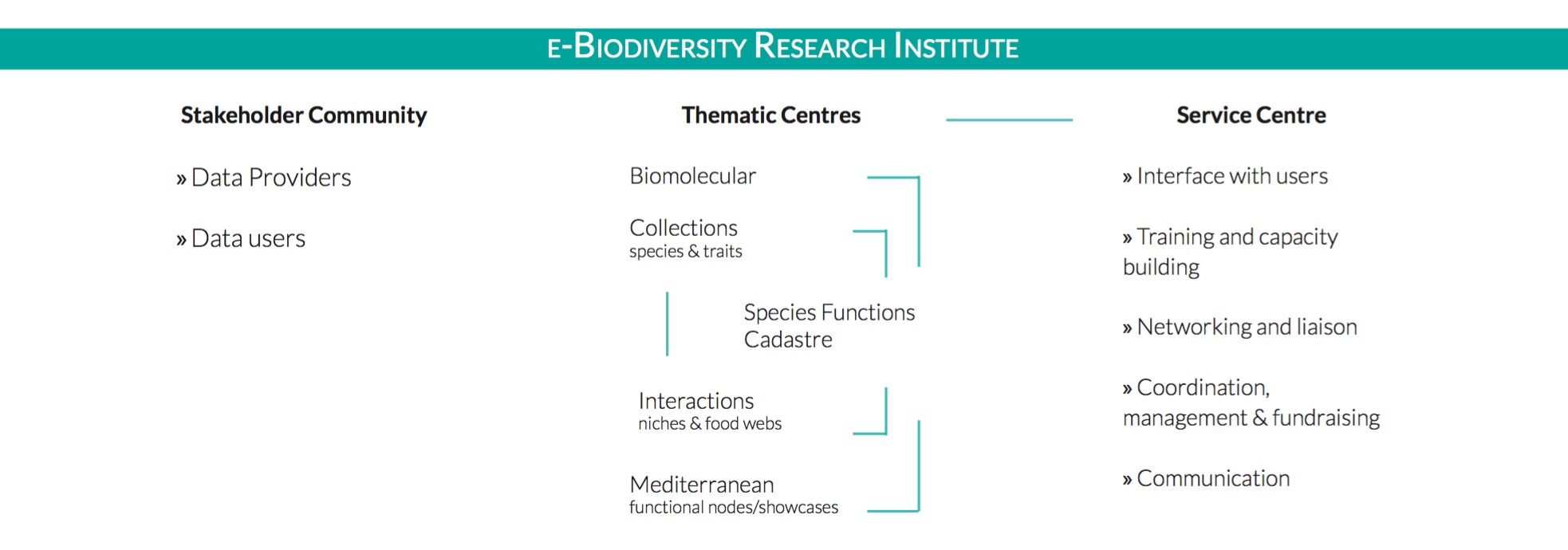
The e–Biodiversity Research Institute of LifeWatch-ITA has branches distributed throughout Italy, focusing on the construction of a functional backbone, and seeks to reinforce integrated scientific research into biodiversity.
The e-Biodiversity Research Institute of LifeWatch-ITA is organised into four thematic centres: Biomolecular, Collections, Interactions and Mediterranean, focusing on species, their genetic and phenotypic traits (including behavioural traits), their niches and their interactions.

Thematic Centres

Biomolecular
The Biomolecular Thematic Centre (MoBiLab – Molecular Biodiversity Laboratory) integrates expertise and advanced infrastructure for molecular and bioinformatic analyses with the aim of providing the scientific community with services and support for the study of biodiversity data. Specifically, the Centre provides access to tools for analysing genomic, metagenomic, phylogenetic, phylogeographic and DNA barcoding data, and to databases specifically structured to allow integrated access to molecular information and associated metadata.

Collections
The Collections Thematic Centre aims to support the creation of the taxonomic backbone (taxonomic hierarchy, names, synonyms, etc.) of the LW-ITA infrastructure. The Thematic Centre will contribute to the updating, standardization and refinement of the data hosted by the infrastructure, making the already existing databases and sources interoperable and accessible through the portal. The Thematic Centre aims to increase and ensure online availability of biodiversity data from collections of Natural History Museums, Research Institutes, National Parks and private collections.

Interactions
The Interactions Thematic Centre aims to integrate the data resources required to study the responses of interacting individuals, populations and species and analyse the mechanisms underlying biodiversity organisation. With this aim, the Thematic Centre will produce tools and services to standardize, integrate and analyse data on inter-individual interactions at the scale (grain and extent) required. The Thematic Centre also aims to provide the Stakeholder community with a series of tools focusing on the protection, management and recovery of biodiversity and its ecosystem services.

Mediterranean
The Mediterranean Thematic Centre (MTC) promotes the study of biodiversity and ecological processes at ecosystem level. It brings together biodiversity data, abiotic data and ecological descriptors at the same spatial and functional scale. The structure of the MTC is based on a network of institutions that make it possible to tackle several topics, a wide range of organisms and long-term data series, focusing on basic questions of biodiversity and ecosystem changes. The sites of the Italian Long-Term Ecological Research network (LTER-Italy) ensure the continuous provision and maintenance of long-term series of field- and nature-based biodiversity and ecosystem data.
Working Groups

Modelling
Modelling is a transversal working group supporting the activities of the e-Biodiversity Research Institute aiming at fostering innovation in data analysis by providing web services for the application of powerful modelling tools to address key emerging scientific questions.

ICT
ICT is a multidisciplinary working group of computer scientists, engineers, ecologists and biologists, transversally supporting the activities of the e-Biodiversity Research Institute and Service Centre by developing or providing ICT services and tools.

Alien Species
This working group aims at developing a LifeWatch showcase on a topic of major interest for biodiversity community by conducting cutting-edge research on ecosystems and habitat vulnerability to alien species invasion, using LifeWatch services and tools.

Citizen Science
Citizen Science is a thematic working group that aims at raising awareness of the relevance of scientific research in biodiversity.

